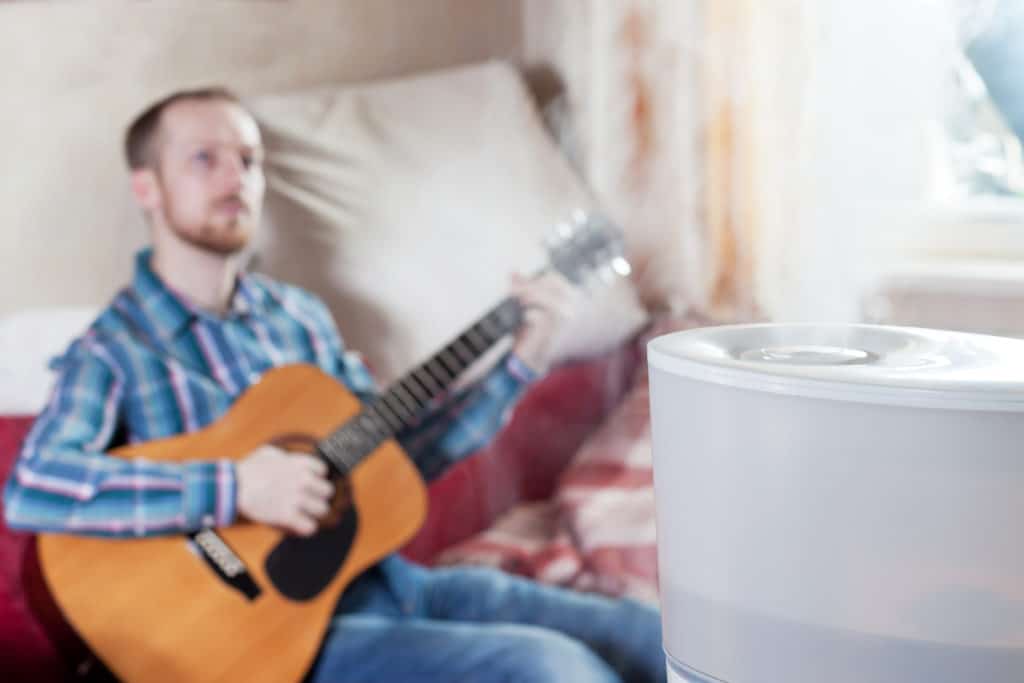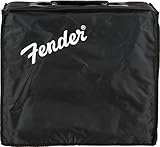Electric guitars are great instruments. Learning to play an electric guitar is one of the most rewarding hobbies one can take up, however, there are some quirks to the electric guitar that you should be aware of. An electric guitar features a lot of electrical parts such as the jack plate, pickup switch, and volume tone knobs, among other parts. These additional components, among other quirks, make the electric guitar relatively unique when it comes to handling, storage, and maintenance, compared to other guitars.
There are a lot of things that you specifically cannot do with an electric guitar. Some of the things listed here are completely fine, even recommended for hollow-body guitars. But when it comes to solid-body electric guitars, these things when exposed to electrical components may damage the guitar’s delicate parts and with time, you may eventually need to replace them. Read on to learn about what you should not do with your electric guitar!
Do Not Humidify

Hollow-body guitars that are made of wood (such as classic or acoustic) may require humidification to avoid cracking. This is because a dry climate can cause the guitar wood to contract faster. When the wood contracts, the glued parts get separated, or the wood cracks. This is a serious problem for hollow-body guitars, but humidification is not necessarily a requirement for solid-body electrics.
One common method of guitar humidification is to store the guitar in a case with a humidifier, but this is not a good idea with an electric guitar. For one, all of those electronic components your electric guitar has are susceptible to damage in an over-humidified guitar case. You don’t want to have to start replacing parts because you over-humidified your guitar. Second, your electronic components have a lot of metal which will begin to rust overtime due to high levels of humidity.
Another important thought is that although electric guitars are made of wood, humidity is not as important to the health of an electric guitar as it is for an acoustic. This is because electric guitars are solid-body guitars. It’s not impossible for an electric guitar to shrink a bit overtime due to excessively low humidity, but it is far less common and less serious than it is for hollow-body guitars. The typical symptom you will see with an electric is that the fret ends will begin to protrude slightly as the fretboard shrinks. This is an annoying problem but it’s not nearly as serious as the body cracking, which can happen on acoustic guitars.
Don’t Use Abrasive Materials to Wipe
It is a common best practice to wipe your electric guitar after playing. This is especially important for the strings, pickguard, and fretboard. One of the benefits of wiping is to remove whatever moisture that has built up on the guitar from your fingers. Wiping down your guitar after playing is important, but it is also important to use the right tool to wipe down your guitar. You don’t want to cause unnecessary damage to your guitar because you used an abrasive material.
Apart from damaging the strings, an abrasive material can also cause scratches on the pickguard. When it comes to wiping the strings and other delicate parts, always use a soft microfiber cloth that is recommended for wiping. Paper towels and tissue are always close at hand but it’s best to rely on microfiber cloths, as other cloths can leave scratches and microfiber clothes won’t leave residue on the guitar.
Do Not Clean Your Electric Guitar with Water
Electronic components + water is a bad idea. Remember this simple rule and your electric guitar should last a long time. Water might seem like the easiest thing to use to wipe down your guitar after a long jam session, but it is inadvisable. You’re not going to damage your electric guitar from using a lightly water-dampened cloth once or twice, but overtime getting the fretboard wet can cause the guitar problems, specifically swelling or softening of the wood may cause loose or popped frets. On a lacquered fretboard if water gets into any cracks in the lacquer it can cause lifting of the lacquer or staining.
Instead, you should use a soft dry cloth and some guitar polish. It is also important to note that, unlike other guitars, electric guitars have more parts to clean. These parts can be wooden, plastic, or metallic.
Do Not Buy the Wrong Amp
When new electric guitar players get their first amp and guitar they are faced with a lot of new controls all at once. Electric guitars might be easier to learn how to play the basics than acoustic guitars, but they are certainly more complicated initially than an acoustic.
There are hundreds of different amps available on the marketplace. Some of them are designed for specific styles of music, some are large and some are small, and some come with different styles and configurations of speakers.
Fender amps are the most popular if you want to play country music, solid-state amps are much more popular among heavy-metal guitarists, and tube amps are very popular among blues guitarists.
My point is that you need to take into consideration the types of music you are interested in, how often you want to play, and how much money you want to spend, before you go out and buy an amp. You don’t want to be left trying to play a Black Sabbath song on an amp that was meant for Lynyrd Skynyrd.
One last bit of advice on guitar amps, stay away from “too cheap to be true” amps. Amps that cost less than $50 will perform like they cost less than $50. A guitar amp is an extremely important piece of equipment and you don’t want to ruin your electric guitar’s playability by buying a Dollar General brand amp.
Do Not Play in the Rain

You have probably seen a music video once or twice with a rock band playing in the pouring rain. You might also wonder how bands play gigs when the weather can be so unpredictable. You can certainly play the electric guitar in the rain, but you should be aware of some caveats.
Playing in the rain is bad news for any guitar, whether it is an electric or acoustic. While the electric guitar itself will handle rain far better than a hollow body guitar, there is a lot of electrical equipment that comes with an electric guitar. One basic rule that an electric guitar player should always be aware of is that electrical components and water do not go well together.
There are numerous cases of amps being significantly damaged due to playing in the rain. Although, this may not be a major concern for a band earning a significant amount of money every show, for everybody else an amp replacement is a significant expense.
If you are playing in a show and you absolutely have to play in the rain, my advice is that you find some sort of cover for your amp. It won’t eliminate the chance of any water getting to your amp but it will significantly reduce the amount of water that makes it there.
Lastly, for transportation, you should get an amp cover. There is nothing worse than moving your electrical guitar equipment around outside and then suddenly the sky falls and your equipment gets soaked. An amp cover will help protect your amp from mother nature’s elements. There are a variety of amp covers available on the market, and they can often be picked up for under $100.
- Polyester cover: stitched Fender logo on black cover, no logo on brown cover
- Designed to fit Blues Junior and Blues Junior III amplifiers (1996-present)
- Height: 16" (40.64 cm)
- Width: 18" (45.72 cm)
- Depth: 9.18" (23.31 cm)
Do Not Play in the Shower
Some people have the habit of playing the guitar immediately after showering. And to make it even worse, playing it inside the shower. Electric guitars can be dangerous to plug in an electric socket when your whole body is wet.
Apart from that, water or moisture can get in contact with the electrical parts of the guitar and may cause some damage. When you do it repeatedly, you will eventually find some parts not working as expected and that will require a costly replacement.
My simple advice is to resist the urge to play your electric guitar right after your shower, make sure you dry off well and give it a solid thirty minutes before you start jamming!
How Do I Avoid Damaging My Electric Guitar?
Since we have looked at what you should not do with your electric guitar, it is also important to know the best practices to help you maintain your electric guitar and avoid damaging it.
Clean the pickups
Dust and oil from the fingers can get to the pickups and when they accumulate, they will not just affect the quality of sound but also the lifespan of the strings. To avoid this mishap, you can wipe the pickups down with a dry cloth or you can even lightly dampen the cloth with a touch of soapy water. You can check out an article on replacing electric guitar strings here!
Avoid moisture
As I have mentioned, moisture or humidity can damage your electric guitar components. Just keep in mind that electrical guitar components and water do not go well together and you won’t have a problem. In addition, you should not touch the guitar with wet hands.
Does dust affect electric guitar?
Dust won’t necessarily damage your guitar by itself, but that does not mean it’s not a problem. Accumulated dust on your electronics and strings will degrade the sound of your guitar, and accumulated dust can in fact damage electrical connections overtime. Therefore, if you are playing your electric guitar in a dusty place, remember to wipe away all the dust before storing it.
Wiping whenever you play the guitar will also help to reduce the accumulation of dust that may not be visible to the eyes. It is also important to note that dust can mix with the moisture and oil on your fingers to form grime that can stick to the parts of your electric guitar.
What Is the Lifespan of An Electric Guitar?
The lifespan of an electric guitar can vary from 10 years to a lifetime. Some cheap electric guitars may last for up to 10 years, some can last for 20 – 30 years depending on care and maintenance practices, and some expensive models may last for a lifetime. The lifespan also depends on the general care and maintenance by the user. You can check out an in-depth article on buying a cheap guitar here.
Conclusion
As we have seen, there are many things that you should not do to an electric guitar. Electric guitars have a lot of components to them and if you want your guitar to last you need to be aware of them and maintain your guitar accordingly. An additional consideration with electric guitars is that they have the potential to be dangerous if handled improperly, things such as (i) playing in the rain, or (ii) playing right after a shower spell TROUBLE for an electric guitar player.
I hope this article was helpful, you can check out some of my other electric guitar articles here!

